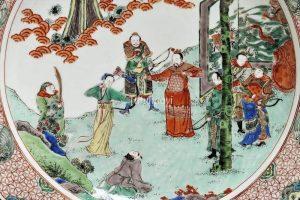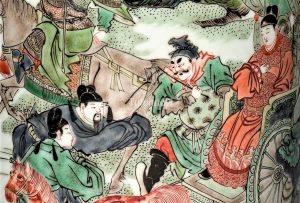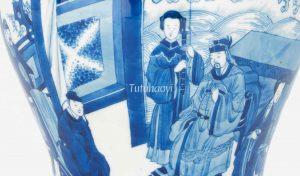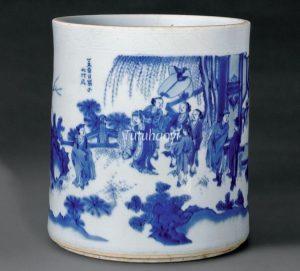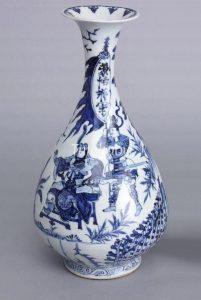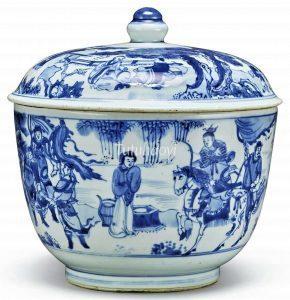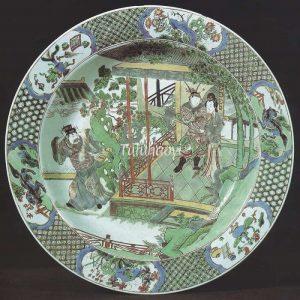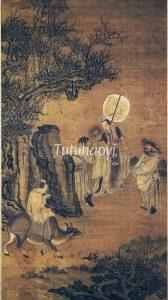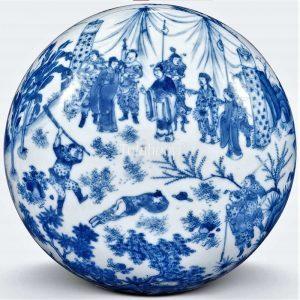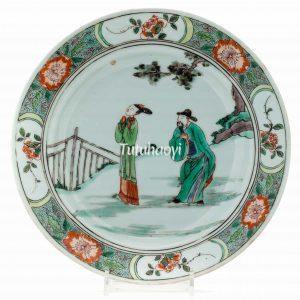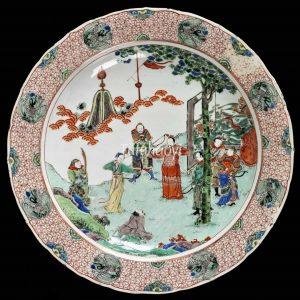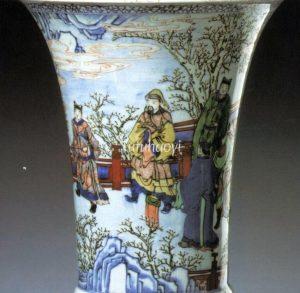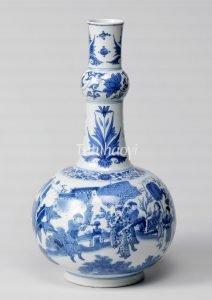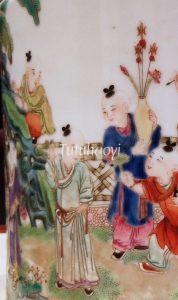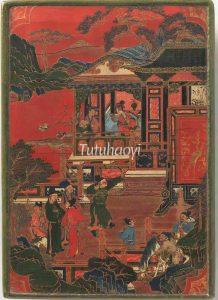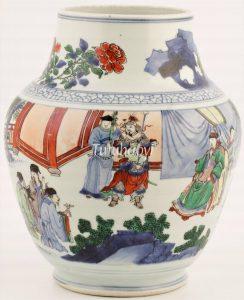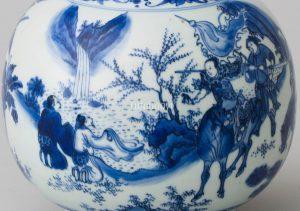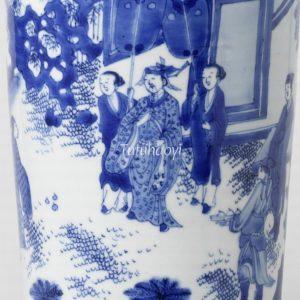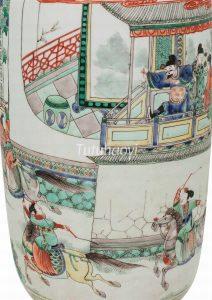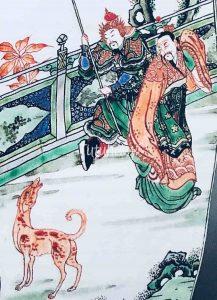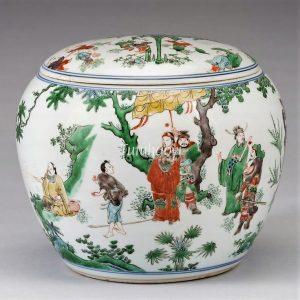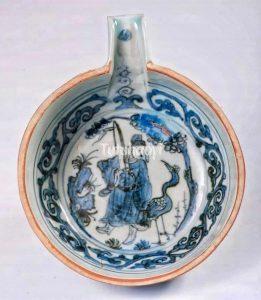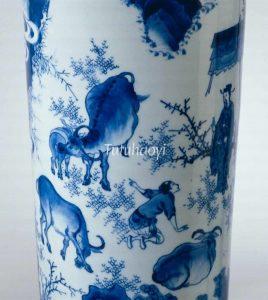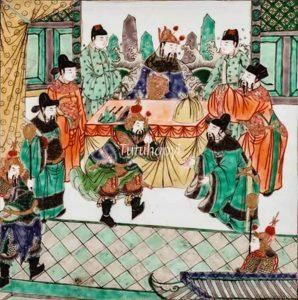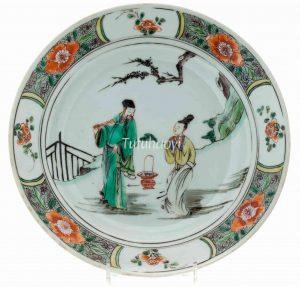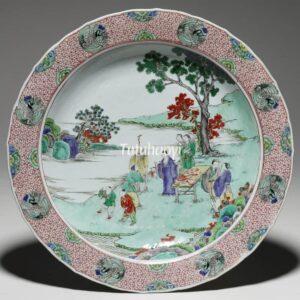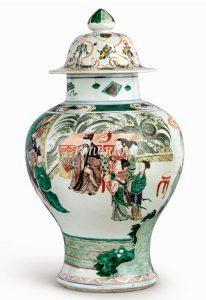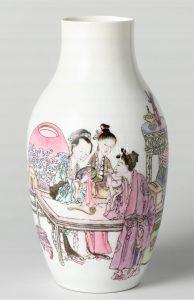Showing Results Containing
Congratulations on art historian Dr Yibin Ni’s new research into a rare story scene in Chinese pictorial art, which may have puzzled contemporary museum curators and porcelain collectors. Dr Ni has traced the art historical context in which this r...
Through analysing a famous theme that depicts Bo Yi and Shu Qi Stopping the Zhou Army, Dr Yibin Ni has compared a number of porcelain vessels from Ming and Qing dynasties, and demonstrated his unique insight which can facilitate the correct dating...
Have you wondered why the same story scenes were painted differently on Chinese artworks? How was it painted to present women falling in love on Chinese antique porcelains? Read on to see what Dr Yibin Ni has to say with his analysis.
According to Records of the Grand Historian (Shiji 史记, Biography of Fan Sui and Cai Ze), during the Warring States period, Fan Sui once served under Xu Jia, a senior official of the State of Wei. On a diplomatic mission to the State of Qi, Fan Sui received gifts from the King of Qi. Xu Jia, suspecting h...
The true name of Guiguzi (鬼谷子) remains unknown due to insufficient historical records, although some suggest the name ‘Wang Yi’. Legend has it that Guiguzi was a figure from the Warring States period (475–221 BCE), renowned as both a recluse and a political thinker, strategist, and Daoist. He is considered the founder of...
General Meng Tian, died in 210BC, was a prominent general in the army of the first emperor of China of the Qin Dynasty. He led a series of successful campaigns against the nomad threat in the north, and orchestrated the ingenious projects such as the road system in the new empire and what is later known as the Great Wall...
This scene was from a popular play ‘The Story of the White Hare’ (Bai Tu Ji 白兔记) and was much admired during the Ming dynasty.
Liu Zhiyuan 刘知远, the hero of the play set during the turbulent Five Dynasties (907–960), became an orphan when he was a teenager. His affluent neighbour looked after him and later...
Guo Ziyi (郭子仪 697–781), a native of Huazhou 华州 (a county near present-day Xi’an 西安), was the most prominent general-statesman of the Tang dynasty. For the great part of nearly thirty years and under a succession of four different emperors, he played a key role in maintaining the stability of the country. He helped to
Guo Ziyi (郭子仪 697–781), posthumously bestowed the title Prince Zhongwu of Fenyang (汾阳忠武王) because of his birth place and his contribution to the court, was the greatest Tang-dynasty general. He played the key role in military campaigns against the Uyghur Khaganate and Tibetan Empire, enemies constantly threatening China ...
Dong Zhuo (董卓 d. 192), a tyrannic warlord rising to power at the end of the Han dynasty, caused great concern among courtiers and officials. Wang Yun (王允), the Minister Over the Masses (司徒 Situ), was entrusted to figure out a plan to bring him down. Dong Zhuo was particularly powerful because he managed to ally ...
‘Li Mi (李密 582–619) Hanging His Books on His Ox Horns’ is one of the inspirational self-improvement stories in ancient China. It was adopted in the famous Three-Character Classic (三字经 San Zi Jing), written in the 13th century. The primer served as children’s first textbook in elementary...
There are thirty-six well-known stratagems (三十六计) that the Chinese politicians, strategists, and businessmen have been using for millennia. One of them is the ‘ruse of inflicting pain on oneself or one’s comrades to gain the enemy’s trust’. The scene depicted here is its most famous illustration.
Zhou Yu (周瑜) was ...
This is a scene from a popular traditional play ‘A Set of Interlocking Stratagems (连环计)’.
The war lord Dong Zhuo (董卓, ? – 192 CE) became a senior minister in the Han court. His tendency to dominate the young sovereign, Emperor Xian of Han (汉献帝, 181–234 CE), gave other ministers cause for concern. They asked Wang Y...
This is a story of a brave woman who boldly exercised her rhetorical competence, managed to correct the erring ruler and saved her husband from execution. The story of The Wife of the Bow Maker in the State of Jin (晋弓工妻) is recorded in Chapter 6 Convincing and Perceptive (辩通传), Biographies of Exemplary Women (列女...
Evidently, Zhao Kuangyin (赵匡胤 927–976), Emperor Taizu of the Song dynasty (宋太祖), often paid unofficial surprise visits to his courtiers. As a result, his ministers did not dare to change their official attire into casual wear even when they returned home from court. They had to be ready for imperial visits any time and d...
The main figure in the scene is a dignitary, often gripping a hu (笏) tablet in his hands, which an official uses to take notes when he has audience with the emperor in court. He is usually sheltered by page boys erecting some fans or a parasol or guarded by a soldier holding a weapon with an iron melon on the to...
A variation of 平升三级 ping sheng san ji (May you have three successive promotions unexpectedly) is 连升三级 lian sheng san ji. The design h...
Li Yuan (李渊 566–635 CE) excelled at horse-riding, archery, and calligraphy as a young man. He was to be the future founder (reigned 618–626 CE) of the Tang dynasty (618–907 CE). Miss Dou was exceptionally smart and her father Dou Yi 窦毅, the governor of Dingzhou, was very particular about the quality of his future son-in-...
The story scene is originated from an anecdote dating back to the Tang dynasty (618-907). Cui Rong (崔戎, 780-835) is a statesman who is important enough to have a position in the ‘Biographies’ section in the official histories The Old Book of Tang (jiu tang shu 旧唐书), completed in 945, and the New Book of Tang (
Bo Yi (or Boyi, 伯夷) and Shu Qi (or Shuqi, 叔齐) were sons of the ruler of Guzhu (孤竹), a vassal state of the Shang dynasty (商朝, 16th-11th cent. BCE). As the king was getting old, he wanted Shu Qi, his youngest son, to inherit his throne. However, when the father died, Shu Qi asked Bo Yi to take over th...
According to the Account of Wu (吴志) in The Records of the Three Kingdoms (三国志), Lu Ji (陆绩), was a native of Wu. At the age of six, he had an opportunity to meet Yuan Shu (袁术), who at the time controlled the region of Jiujiang. Yuan Shu put out some tangerines for him to eat. Lu Ji surreptitiously stuffed three of them in...
Emperor Yang of the Sui dynasty (隋炀帝, r. 606-18) is known for many achievements, such as linking the Yellow and Yangzi Rivers with the man-made Grand Canal, leading successful military campaigns expanding the Sui territory, and being accomplished in the arts. Despite those, Emperor Yang is also considered to have brought...
When the old duke of Jin (晋) passed away, his heir was still in the cradle. It was with the powerful minister Zhao Dun (赵盾)’s support that he succeeded in ascending the throne. Unfortunately, the young duke, who was posthumously given the title Duke Ling of Jin, Jìn Líng Gōng (晋灵公, ? – 607 BCE), became increasingly the o...
When the Baron of the Zhou vassal state (周西伯) did a divination with oracle bones for his imminent hunting trip, the message came: ‘You will not catch a small bear or a large bear, but a teacher will be presented to you by the divine power.’ After bathing and fasting for three days, the baron arrived at the River Wei, he ...
Zhao Bian (赵抃, 1008–84) was held in high esteem all his life and posthumously because of his incorruptibility and sound statesmanship during his entire career. His prize possessions were legendarily well-known: a qin zither and two pets, a Continue Reading
When Bing Ji (丙吉 d. 55 BCE) was a chancellor in the Han court, once he encountered the aftermath of a gang fight in the street. Bing Ji passed them without batting an eyelid. Further ahead, a buffalo passed and it looked out of breath. Bing Ji had its owner stopped and inquired about the buffalo’s heavy panting. Bing Ji’...
According to Confucian ethics, a man’s ambition and pride need to be balanced by humility.
General Lian Po (廉颇, active 298–236 BC) and Minister Lin Xiangru (蔺相如, active ca. 279 BC) were colleagues in the government of the state of Zhao. When Lin Xiangru received a higher appointment than Lian Po’s, Lian Po felt it...
Qiuhu (秋胡), a native of the state of Lu during the Spring and Autumn period (770-476 BCE), was ordered to take up an official post in the state of Chen a scant five days after his marriage to Jiefu (洁妇), the ‘Loyal Wife’. Five years later, on his way back home, he encountered a woman by the roadside picking mulberry leav...
Young Chen Ping (陈平, ?–178 BCE), later a minister of Western Han dynasty, as being an exemplar of fairness in his everyday work. According to Sima Qian’s (司马迁, 145BCE – ?) famous work Historical Records – Prime Minister Chen’s Family (史记 – 陈丞相世家 ), one day, Chen Ping’s village held a ceremony to offe...
With strategic plans to restore the war-torn country back to order, the talented scholar Li Jing (李靖) was paying a visit to the powerful Lord Yang Su (杨素), who enjoyed luxurious ways of living and female company around him. To Li Jing’s disappointment, Lord Yang did not take his plans seriously. However, Red Fly Whisk (红...
Zhang Chang (张敞, ?- 48 BCE) and his wife grew up in the same village. When they were both children, Zhang Chang once threw a pebble at his future wife and, unfortunately, the scratch left a scar on one of her eyebrows. Later, Zhang became a civil servant and learned that the girl he once hit with a pebble was unmarried b...
